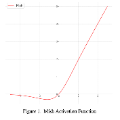Activation functions enable neural networks to learn complex representations by introducing non-linearities. While feedforward models commonly use rectified linear units, sequential models like recurrent neural networks, long short-term memory (LSTMs) and gated recurrent units (GRUs) still rely on Sigmoid and TanH activation functions. However, these classical activation functions often struggle to model sparse patterns when trained on small sequential datasets to effectively capture temporal dependencies. To address this limitation, we propose squared Sigmoid TanH (SST) activation specifically tailored to enhance the learning capability of sequential models under data constraints. SST applies mathematical squaring to amplify differences between strong and weak activations as signals propagate over time, facilitating improved gradient flow and information filtering. We evaluate SST-powered LSTMs and GRUs for diverse applications, such as sign language recognition, regression, and time-series classification tasks, where the dataset is limited. Our experiments demonstrate that SST models consistently outperform RNN-based models with baseline activations, exhibiting improved test accuracy.
翻译:暂无翻译



